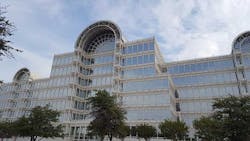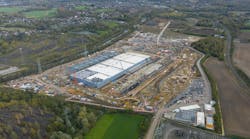The Equinix Infomart: What It Means for the Data Center Industry
The lines between data center business models have been blurring for years, but they still matter to acquirers and investors. The alignment of facilities and business models looms large in this week’s announcement that Equinix will buy the Dallas Infomart for $800 million.
The deal is a strategic win for Equinix, and also addresses the somewhat bifurcated nature of the portfolio of Infomart Data Centers, which was formed in 2014 by combining wholesale and retail colocation businesses. The transaction also changes the game for the remainder of the Infomart portfolio, offering a clearer value proposition to acquirers and investors.
Equinix had many reasons to covet the Dallas Infomart, the leading carrier hotel in one of the nation’s most important data center markets. Its strategic importance is reflected in the premium purchase price, as Equinix paid $800 million for a property that generates $50 million of revenue a year.
Of that $50 million in annual revenue, $20 million is rent from Equinix, which operates four data centers within the Infomart. That existing footprint provides a compelling incentive for Equinix to control the property, rather than having a rival provider as the new landlord.
The Infomart deal also gives Equinix control of the two leading hubs for data traffic to Latin America. Equinix already owns the NAP of the Americas in Miami, which it acquired when it bought a portfolio of Verizon data centers last year.
The Infomart property on Stemmons Freeway also offers additional capacity, a key attribute for data center companies in expansion mode. Equinix noted that the Dallas property “provides significant expansion opportunities to Equinix through the existing underdeveloped capacity (approximately 11MW of power), as well as the potential to develop additional capacity (approximately 40MW of power) on land adjacent to the Infomart building.”
Focus on Dallas, Not Wholesale Assets
Given those attributes, Equinix sought to move decisively with an aggressive bid to secure the deal. “We recognize that it is a high-value deal,” said Keith Taylor, the CFO of Equinix. “But our belief is that we’re going to get the returns and we’re going to develop a strategy that will drive value to the bottom line over the not-too-distant future.”
There’s also the matter of the other properties owned by Infomart Data Centers. Here’s where the business models come into play. Equinix has historically focused on leasing cages and cabinets, often at premium pricing due to the excellent connectivity of its data centers. The Dallas Infomart is also predominantly a retail colocation and interconnection facility.
Infomart’s facilities in San Jose, Portland and Northern Virginia operate under a wholesale model, where tenants lease entire turn-key data halls. Although Equinix is pursuing strategic wholesale deals with hyperscale clients, the Infomart wholesale properties didn’t fit the bill.
“We would have taken a look at the total asset,” said Peter Van Camp, Interim CEO at Equinix. “But frankly, the most strategic part and interesting piece of it all was the Infomart in Dallas, and so we didn’t push as hard for the remaining assets. There was nothing unique or different from a strategic level in those other assets, whereas now that we have Infomart Dallas, the interconnection and network routes to everything to the southern half of the Americas kind of flow to Equinix. And so the Infomart Dallas became the real interesting objective.”
An Iconic Dallas Property
Infomart Data Centers was created in 2014 by ASB Allegiance Real Estate Fund, which owned both the Infomart and Fortune Data Centers, a wholesale data center specialist based in San Jose that also operated a property in Hillsboro, Oregon. ASB merged the companies under the banner of Infomart Data Centers, with Fortune CEO John Sheputis heading the combined company. To create a national data center footprint, Infomart Data Centers acquired an existing facility in Ashburn, Virginia.
The atrium of the Dallas Infomart is modeled after the Crystal Palace in London. (Photo: Rich Miller)
The Dallas Infomart is a major player in one of the nation’s busiest and most competitive markets. The Dallas data center market is home to 2.5 million square feet (SF) of commissioned data center space, representing 278 megawatts (MW) of commissioned power, according to market research from datacenterHawk. That makes Dallas the third-largest market for data center space in the U.S., trailing only Northern Virginia and Silicon Valley.
“As Dallas becomes an increasingly strategic North American interconnection hub for businesses making the shift to digital, the acquisition of the Infomart will enable existing and new customers to scale their operations with Equinix,” said Karl Strohmeyer, President Americas for Equinix.
The Infomart is an early example of carrier hotels, buildings in the central business district of major cities that emerge as hubs for network connectivity, attracting dozens of providers. Carrier hotels became the early cornerstones of the Internet economy, and some of the most successful properties in the colocation industry.
A key piece of the business model is the meet-me room, a common area where providers can make connections between their networks. Interconnection facilities can be operated by building owners, non-profits or commercial service providers. As we noted in 2015, surging interest in interconnection has made carrier hotels sexy again.
Built in 1986 by legendary Dallas developer Trammell Crow, the Infomart’s distinctive glass facade was designed as a replica of the Crystal Palace built in London in 1850 as part of the first World’s Fair. The 1.58 million square foot property struggled for years to fulfill that vision, but found a niche in the early 1990s when it began leasing space to telecom tenants. The Infomart quickly developed into one of the major carrier hotels in Dallas, along with 2323 Bryan (the Univision Center).
The Infomart has approximately 45 tenants, including networks, colocation providers and office tenants. Equinix is the largest tenant accounting for approximately 40 percent of the lease revenues from four IBX data centers (DA1, DA2, DA3 and DA6), which combined, support approximately 3,500 built out cabinets.
Merger Brings Updates
The 2014 merger brought new investment and energy to the 100-megawatt connectivity hub on Stemmons Freeway. In 2016, Infomart began facility-wide security renovations, greatly improving the monitoring of the infrastructure, tightening door access, and adding a Security Operations Center expanding security staff.
The tenant base consists of many service providers. In addition to Equinix, the building houses several data suites for Cologix, Flexential (ViaWest), IBM SoftLayer, Green House Data, XO, and Zayo
The company also developed a number of wholesale suites, offering between 500 kilowatts and 3 megawatts of space. Infomart hasn’t disclosed any wholesale customer wins, but North American Data Centers, which tracks wholesale data center leasing, has reported that the Infomart landed a 2 megawatt deal during 2017.
Infomart also created a 1 megawatt wholesale suite on the first floor of the building, removing a cafeteria and renovating the space for data center use.
The entrance to a 1-megawatt suite on the ground floor of the Dallas Infomart, just off the building’s distinctive atrium. (Photo: Rich Miller)
The Infomart team also developed a plan to add more than 500,000 square feet of data center space and 30 megawatts of additional capacity by adding a second building on the Dallas campus, which is surrounded by large parking lots. One approach involved creating a new parking deck and then use the existing parking lots to add more generators and a second building.
Equinix is keenly interested in pursuing that expansion.
“Being able to build contiguous to that space is going to be very important to us,” said Taylor. “We believe we can drive immense intrinsic value to the business and to the shareholders by building out that capacity.”
The Wholesale Opportunity
So what does this mean for the Infomart wholesale properties? Infomart Data Centers has not yet made any announcements about the future of these properties, but there is significant industry expectation that these assets will eventually find a buyer.
One thing is likely: the wholesale portfolio may not remain “Infomart” for much longer, as that brand is closely associated with the Dallas property.
More importantly, the divestment of the Dallas Infomart leaves a clearer value proposition for investors or acquirers who are focused on the wholesale market, and no longer have to worry about engaging in a bidding war with Equinix.
A hallway inside the Infomart data center in Ashburn, Virginia.
The wholesale data center market has been a leading beneficiary of the growth of cloud computing, as companies like CyrusOne, Digital Realty, Cloud HQ and Vantage have signed large leases with hyperscale providers seeking server capacity. This has prompted a number of providers to retool their business models and construction processes to compete for hyperscale customers. It has also attracted new market entrants, like EdgeCore, which launched this week to target hyperscale deals in leading markets.
There’s plenty of investment interest in the wholesale market, as seen with EdgeCore, which is backed by the sovereign wealth fund for Singapore.
An intriguing element is Infomart’s new data center in Northern Virginia, which is the hottest market on the planet right now. The company has taken its time retrofitting the property in Ashburn, which was built for AOL in 1998 as a sturdy and resilient Tier IV facility. Infomart has recently completed commissioning of the first phase, which offers 10,000 square feet of raised floor space. The 180,000 square foot building has 18 megawatts of power capacity, along with a new cooling and mechanical plant.
In San Jose and Portland, Infomart has worked with utilities to develop direct access programs that allow industrial customers to source electricity from a selection of energy suppliers. Infomart’s growth in Portland is driven by a major expansion by LinkedIn, which has created a data center combining high density with exceptional efficiency and sustainability.
With the announcement of the Equinix purchase of the Dallas Infomart, the data center industry will be watching for developments with the rest of the Infomart Data Centers portfolio.
About the Author



